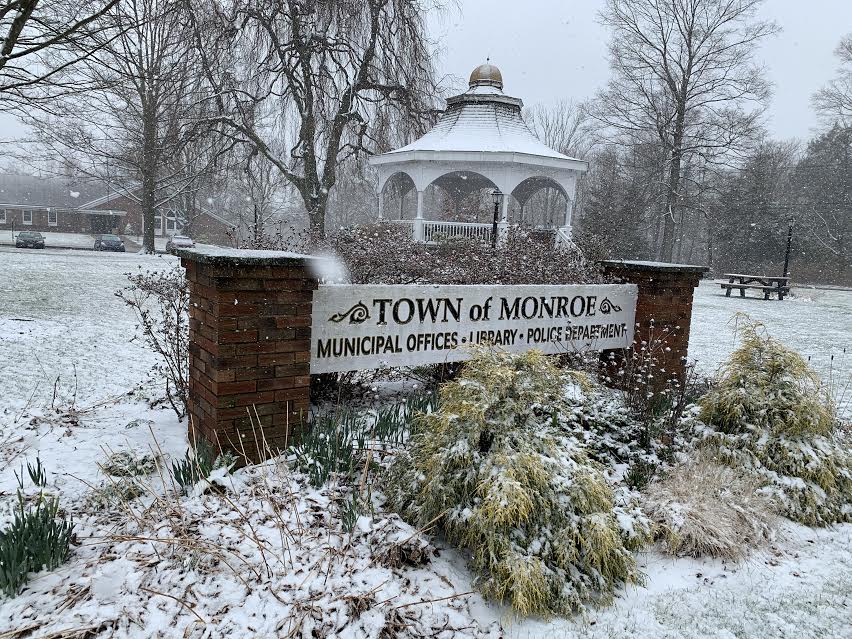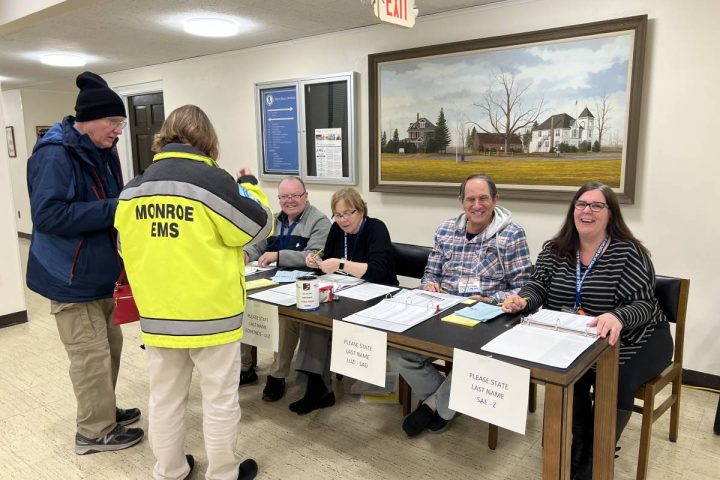MONROE, CT — Taxpayers opted not to weigh in on the $99.86 million town budget proposal Tuesday night. A hearing held at Monroe Town Hall, and via phone and Zoom, did not garner any comments from members of the public.
However, a budget discussion did occur among First Selectman Ken Kellogg, Town Council and Board of Finance members in a joint meeting earlier in the evening.
Kellogg’s town budget proposal carries a projected 2.58 percent tax increase. However, changes may be made to the final number before it comes to voters at the referendum on May 2.
A presentation of the first selectman’s budget can be reviewed by clicking on this link.
The Town Council will review the $31,367,821 budget for municipal expenditures. Then the Board of Finance will review the entire town budget, including the $67,683,424 proposal to fund Monroe’s public schools.
As the proposal stands today, overall spending would increase by 3.25 percent.
The municipal budget represents a $569,411 or a 1.85 percent increase over the current $30,798,410 spending plan. Education spending would increase by 4.8 percent, which is $3,100,758 more than the current $64,582,666 budget.
The Board of Education had requested a 5.77% increase, before Kellogg cut it by $475,000, while factoring in available grant funds the school district could use.
Not terrified, not happy either
During a joint meeting of the Board of Finance and Town Council, Board of Finance Chairman Michael Manjos said his board will take a hard look at the education budget.
“There were some decent increases, certainly on the Board of Ed side,” he said. “Ken’s done a nice job from what I can see of mitigating a lot of that and getting it to a level that I’m not terrified of. I’m certainly not happy with it, but it’s a good starting point as far as I’m concerned.”
Manjos gave “kudos” to Kellogg, Ronald Bunovsky Jr., who is the finance director for both the town and the school district, and Heidi Meade, assistant director of municipal finance, for their long hours of work on the budget.
“I think we have to recognize that this is probably the most detailed and transparent that I’ve ever seen,” Manjos said of the budget. “It seems to get better every year and I appreciate that. It makes all of our work easier.”
Manjos said the town is in “very good financial health.”
The town’s projected undesignated fund balance of $20 million is the highest on record, accounting for about 20 percent of total expenditures, while far exceeding the Board of Finance’s recommended range of 8.3 to 16.7 percent, according to Kellogg.
Kellogg proposes using about $3 million of it to offset taxes.
“I’m sure it’s something the Board of Finance will discuss at length,” Manjos said.
He spoke of the need for a long term plan to use money from the fund over a multi-year period to provide tax relief, rather than using a huge chunk in one year, which would result in a higher tax increase the following year when that money is no longer there.
Manjos said he is happy with where the town is in bonding for projects with $5.7 million coming on and $5 million going off. “Our debt is nearly half of what it was 10 or 12 years ago,” he said.
Because the capital projects were well vetted, Manjos said a meeting on it with the finance board and Town Council may not be necessary this year.
Kellogg said a $43 million net increase in the grand list will provide significant help in reducing the size of the projected tax increase. The October 1, 2022 grand list shows a net of $2,355,143,159 in taxable property values.
Manjos said the Board of Finance wants to work on a “multi-year model” for the budget with assumptions projected two or three years into the future to determine if there are any surprises to plan for.
Budget questions
Town Council Chairman Jonathan Formichella noted how towns lost motor vehicle tax revenue this year when Gov. Ned Lamont lowered the motor vehicle tax cap, and he asked what the expectation is for the next budget.
Kellogg said Monroe received funding from a municipal sharing grant it usually does not get, so the current fiscal year had no financial hole because nearly every dollar of lost motor vehicle tax revenue was matched.
But the first selectman said he was told not to expect that grant money this year, so it is not included in his town budget proposal.
Steve Kirsch, a finance board member, said he was concerned about some capital projects being pushed back and, since the town has not been bonding for as many projects of late, he wondered whether they should do some more.
But Manjos said he wouldn’t be willing to do that now because of high interest rates, which are expected to remain high.
Dee Dee Martin, a town council member, said a lot of things on the list of capital projects were pushed back for “very good reasons.” “But we may want to take another look,” she said.
“We’re not at a place where I would say, ‘absolutely not,'” Manjos said, adding it is up to the first selectman and Town Council to make any recommendations.
Jason Maur, a council member, said the town may have had a chance to do more projects when interest rates were lower, but missed the window.
Kirsch noted how grant money for the Board of Education will not be there once it is used up, leaving property taxes to fund more of its budget after that.
The school district had a recent history of declining student enrollment and staff reductions, he said, adding, “we’re in a different environment, so people have to keep that in mind.”
All respectful comments with the commenter’s first and last name are welcome.







The first version of this story said First Selectman Ken Kellogg proposes to use $3.5 million from the undesignated fund balance to reduce the tax increase. He proposed using $3 million and the article was revised to reflect that.